Meher Baba
The teachings of Indian spiritual master Meher Baba were a heavy influence on Pete Townshend during his peak creative period as a composer, primarily between 1967 and 1980. Pete's spiritual aspirations were the driving force behind many of his greatest compositions, giving his work extraordinary depth and timelessness. In many ways this is what sets Pete apart from other artists of this era.
Here is the story of Pete Townshend's spiritual relationship with Meher Baba and how it affected his life and work, as told in Pete's own words, sourced from various interviews and articles over the years.
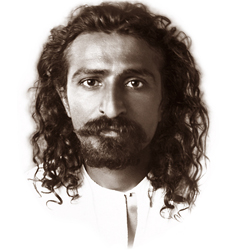
Pete Townshend speaks of Meher Baba
“Only one person on this earth is capable of an absolutely perfect love for all and everything, and that is, when earth is fortunate enough to be his illusory host, the Messiah. The Avatar. He just came and went. Meher Baba.
"Baba's life story is well known: He was born in a town in India called Poona in February, 1894. While in college, he built up an affection for an old woman named Hazrat Babajan, who was in reality a Perfect Master. One day she kissed him on the forehead, and from that moment he was changed. He neither ate nor slept for months, and spent the next seven years in study with the five Perfect Masters of the time. One of these Masters, Upasni Maharaj, threw a stone at Baba, hitting him at the spot where Babajan had kissed him, between his eyes. It was at this moment that Baba became aware of his role and destiny as a Perfect Master himself.
"Meher Baba did not speak at all from July 10th, 1925 until he died in 1969. His silence was of great symbolical meaning. Baba said, "You have had enough of my words, now is the time to live by them." He also said that the breaking of his silence would occur before he dropped his body, and that the impact of the word he would speak would bring an incredible surge of spirituality to mankind. In later life, Baba explained that the "word" he would speak would not be a word in the ordinary sense, but would be in his own Divine language. (I often wondered previous to hearing this how Baba would manage to utter even a single word after 40 years of silence without a terrible croak emerging, but at last I heard that Baba did in fact speak to himself, his vocal chords functioned.) The effect of this word on any given individual would depend on that individual's readiness to receive it. The spiritually prepared would get it at full force, receiving a push towards Self-Realization that they couldn't normally achieve even in many incarnations. The unprepared would feel nothing, but all mankind would receive an immense spiritual push. I held that Baba's word has been spoken, probably about the time of his death. I felt confused that I was suffering from a bout of flu when Baba was about to drop his earthly body. We were playing in Newcastle the day he died, and when I got home and the news was broken to me I felt as if I had betrayed myself. I felt as if I hadn't had enough time to really make myself ready, to learn to love Baba and hang tightly to his apron strings as the whirlwind of spiritual events around the closing of his manifestation speeded up.“ [1]
The discovery
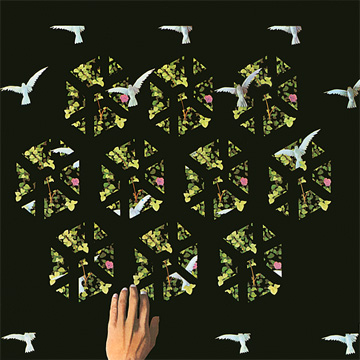
“I first heard about Meher Baba from Mike McInnerney in Autumn 1967. Mike later became very involved in the development of my own work on Tommy, and it was in the knowledge that he was a Baba lover; and able to grasp the needs of the evolving album, that I asked him to do the art work connected. Every time I came up with a world-wise theory that had taken me years of thought to get clear he would say, "That's such a coincidence man, this guy Meher Baba said something similar to that in this book, The God Man." After I had heard my very last precious revelation hit the dust at the sound of Mike's voice declaring that Baba had already said it I just had to look at the book. What I saw apart from a photo in the front cover of a strange and elderly man, was shattering. Sure enough, each theory that I had expounded, many to do with reincarnation and its inevitability when considered in the light of law of averages, were summed up in one sentence.” [1]
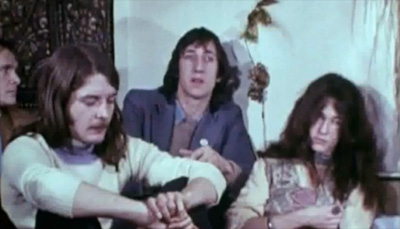 Pete with Mike and Katie McInnerney
Pete with Mike and Katie McInnerney
Pete's spiritual relationship with Baba over the years
“What was so sneaky about the whole affair was the way Baba crept into my life. At first his words were encouraging, his state of consciousness and his claims to be the Christ exciting and daring, later they became scary. I began to read his words, read of his astoundingly simple relationship with his disciples (Mandali) and of his silence for 40 years. It became clear that the party was over. If I read any more lines like "What I want from my Lovers is real unadulterated love, and from my genuine workers I expect real work done," I would have to decide once and for all whether the whole thing was really for me or not.
"Maybe I should try to talk about how Baba affects my life and how his presence helps or changes things in my work. The thing I tell people that ask me this question is that nothing ostensibly changes when an individual hears about Baba and starts to devote time to thinking about him and his work. No all-pervading joy creeps into life, no formula for solving difficult problems. In some cases it seems to bring problems to a head. At least they are over with that way.
"Your troubles are not over however, and the exhilaration you felt when Baba revealed his Infinite Majesty to you is deflated like a tire with a blowout, explosively, as Baba, beginning and initiating, takes you through your first real taste of loneliness. Longing, pleading, desperate and even more dependent on ego than before, you attempt to work out how it all came about. You didn't meet Baba, didn't even read much of his teachings. What you read was simple, not astounding. It seemed so right though. Who was it that said, DON'T WORRY. BE HAPPY? Could I ever forget?
"Just as he gives you the first real taste of love, unqualified by any commitment you may or may not make to him and his life, so you yourself take it away. Unprepared to receive such upfront and powerful love, the individual hides from it. Partly in shame, but mostly in pride. Once you've hidden, it’s hard to find the person from whom you're hiding. The rub is that Baba seduces you.
"I never met Baba. Never wrote him a letter or received one. How am I hanging on? I'm not hanging on, I'm stuck on. People could easily get the idea that I'm an unwilling Baba lover, or "Baba Tryer" as I prefer to call myself. No, it's just that I was unwilling to let go of that incredible piece of happiness, that unqualified stab of love that I didn't even ask for, didn't expect, and it's made my life, which I know to be as colorful as any, gray in comparison.
"As the river flows down outside my home, I look out and remember that eventually it will reach the sea. Each little stream that runs into the Thames feeding it and building it sustains the ocean. Retains the cycle of life that keeps our planet moist and airy. We too need sustaining, love is the only thing that can do it.” [1]
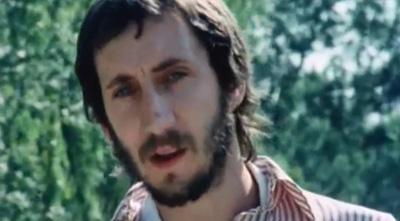
“A lot of people equate finding a spiritual master with discovering the escape clause in life. Actually it's just the opposite, All that happens is that, for the first time in your life, you acknowledge the fact that you've got problems instead of futilely trying to solve them. The problems become more acute, yet somehow less painful. Still, they don't get solved automatically. The only way in this lifetime that you can move something from A to B is to get up and fucking move it. There's no magic. All Baba has done is to get me to start looking outside myself and tempering all my results in his terms rather than my own.
"My main fear at the moment... I mean this is a very bad thing to say, but I'm very worried that I'm fucking around with the most serious thing a man can ever wake up to. And that's the fact that I very sincerely believe I know the route to perfection. That route, in my case, is through living my life in a way that would please Baba. I get very scared when I see that I'm fucking around with my life. I'm my own witness, I know when I'm doing it right according to my own set of rules. I get scared when I don't live up to those rules, that's all. I get scared when I see I'm not my own master. I feel there's a power within me that's getting more and more impatient with me, like a schizophrenic situation.” [2]
“You bring up Meher Baba and express surprise at the amount that hasn't changed in me. What makes following Baba different to following anybody else is that you don't change at all. You don't look upon ego, in the true mystical sense, as being an enemy. You look at it in proportion, and you realize there is the thing which is driving you, and it's eventually going to destroy itself. But you need ego right up to the end. Baba put it in an incredible way once. He said that when somebody finally is on the brink of a decision between surrender to the infinite and holding onto illusion, holding onto life, it's the ego that is necessary to make that last jump. You still need the ego to say, 'I am God.' or 'I surrender,' or 'That's it, I've had enough.' And the other thing he said is that life gets sweeter and sweeter, so it becomes harder and harder to move on. So in the rock business, as a rock writer, sometimes I feel kind of out of place, like pretending that I can have any kind of spiritual poise at all when I have to adopt a sort of egoistic rock stance to work.” [3]
“Yesterday was Meher Baba's "Amartithi." Followers of this great Master (to whom I remain committed) celebrate the anniversary of his passing in 1969. In the afternoon, I saw a film of his entombment and felt a most powerful feeling of his presence throughout the day. It is incredible to me – as I'm sure it is to many witnesses of my day-to-day behavior – that I still feel so moved by Meher Baba's words, photographs and films. After following him for nearly nine years, I have fallen deeply into the rhythm of focusing all my reflections on life through a lens formed of experiences I have had under his spiritual umbrella.
"Back in England, I got hold of a building for the London Meher Baba house and one morning, early, sat thinking about the past year. I thought about the incredibly circuitous route I had taken to bring me to that point in October 1975, a new British Who tour ahead of us. I got to where I ended up. Having taken energy, freely given, from just about every source I could lay my hands on, being strong again and feeling fairly certain that I could now rock & roll right into my grave, I decided that I could dare to ask for just one more directive. I raised my eyes to the heavens, my future Meher Baba house looming up as a great potential encroachment on my time with band, and asked the old man: "What conclusions do I draw from all this, Baba? Where do I put this love you've given me?" The answer came out of the sky, in a voice that, to me, was audible in a fantastic sense: "Keep playing the guitar with the Who until further notice." Where am I and what am I? I kneel at the foot of a picture of my Master, I plead forgiveness, but in dreams I gloat. The superb and beautiful creatures that have lain at my feet. What am I? I look in the mirror and don't see much. Am I purely a fraud? Fall in, all you cynics, but how about your own admirers? The people I observe fall at my feet, but why? I think I know. The ego floods away from me like the crutch snatched from a cripple. But the feeling is not bad; they love me for what I could be, not for what I am. When I screamed for God to smash me down, I didn't expect for a minute that he really would.” [4]
“So one way or another, fair and foul, I have been following Meher Baba for thirty four years. Today I avoid making public pronouncements about his status as a spiritual master. He claimed to be the Avatar (another word for ‘Christ’), but so do other self appointed masters in India and elsewhere. I have my own conviction, and I enjoy a very intimate and special relationship with him that – because he passed away in 1969 (two years after I started to follow him, and before I had a chance to meet him) – is entirely spiritual I nature. I enjoy his sense of humour if that doesn’t sound too daft. I often feel that I can see mischievous signs of his presence in my daily life, coincidences or delightful moments. But I feel Meher Baba too in the darker side of life we all face today. My own journey required that I learn some true humility, and also not to take myself so seriously. My drinking and drug crash would have meant little had I been content to be just a rock star, it might even have helped my career. But, as someone who had vaunted so often the spiritual power of music and audience congregation, I fell further when I crashed. I am thus - I hope - more tempered and less melodramatic about spiritual matters. I hope too that I am in a better position now to speak about what it is that really makes me continue to follow Meher Baba. It is quite simply that I have come to love him unconditionally. That might seem dangerous, but I am asked to give no money; I am asked to make no public statements on behalf of those who carry out the work of carrying his message to the world. I am asked for nothing, except sometimes my presence in India to say goodbye to the remaining older disciples who fondly remember my musical visits in 1972 and 1976. I remember my friends in India fondly too, and I miss them. I hope it is true humility and not lost pride that prevents me from running back like some kind of Prodigal celebrity. I concentrate my efforts now on the MEFA film archive project, and in finding Meher Baba in the rhythm of my daily life.” [6]
"I am not stupid enough to try to convince anyone that - in Meher Baba - I have stumbled upon the only person on earth who might be able to explain the Universe, but I am smart enough to have noticed that unlike many other spiritual teachers Meher Baba was surrounded by some pretty cool people, and he has a great smile. So? I'm a bimbo. If you think you are not a bimbo too (with regard spiritual matters) you are probably Deepak Chopra or the Dalai Lama, both of whom I begrudgingly accept know a lot more than I do about the Universe, and Golf. I'm only half joking. Meher Baba used to say God plays marbles with Creation. Didn't someone very clever say that he didn't? Golf is good middle ground here between science and silence. Meher Baba turns the evolution arguments of today between Darwinists and Creationists on their heads. He states that what matters in evolution is that it is consciousness that evolves and its requirement to rise, and to return to infinity, is what drives every aspect of evolution - even religion. Very interesting stuff. Easy to shoot down. Easy to accept. Impossible to understand. Like everything that really matters in this wunnerful world." [24]
“In my book I speak about my early days, stumbling between my interest in the Indian master Meher Baba, family life and the rigours of rock ‘n’ roll. I have ended up somewhere in the middle. The almost blind belief I carried when I was a young man – that, as Meher Baba taught, consciousness itself was all Creation consisted of, and that consciousness is what evolved, not matter or particles – seems scientifically nonsensical to me today. Yet I still question who I am, where I came from, and where I might be going. I am still following Meher baba, but my fingers are crossed behind my back.” [7]
"Many Who fans will know I have been a follower of Meher Baba since 1967. Sometimes I am unsure of the sanity of believing that Meher Baba is God in human form, as he claimed. But Anita Viellard, a light-hearted and glamorous Parisian artist I knew very well, told Baba 'We don’t mind you thinking you are God, we just love you anyway.'” [13]
Baba and drugs
“I approach another of Baba's most powerful and controversial statements: "Drugs are harmful mentally, spiritually and physically." I repeat these words parrot fashion, not knowing honestly whether I would have said it myself had Baba not said it first. Baba didn't go on at any real length about dope. He didn't feel there was any point, I suppose, as he had more or less come to the conclusion that by the time he became aware of its ever growing popularity in the West he was too old to travel again to the West, and he is too compassionate to be overly heavy. But Baba did emphasize to a young devotee going to see Baba in about 1966, that the biggest single gesture a man could make for youth, would be to spend his life trying to show the dangers of dope. Remember, Baba was concerned with a set of people that felt the psychedelics held the key to religious experience, to Universal consciousness. God in a pill. After about six months of Baba following, Baba was still alive then, I met a guy in San Francisco who had met Baba in India called Rick Chapman. Rick lives in Berkeley and runs Meher Baba Information from Box 1101 at the Post Office there. He is the man responsible for the glut of DON'T WORRY, BE HAPPY cards that you must have seen if you live in San Francisco. As we sat in a shared hotel room in San Diego I rolled a joint, spouting some high flown guff about being a happy Baba lover. Rick took it very calmly considering that he spends a good part of his time lecturing on the spiritual side effects of "soft" drugs and what Baba had said about them. Anyway, that day was my last stoned day in the normal sense. It was easy to give it up. Like a lot of others, I was getting a little bored with pot highs which seemed limited to the strength of my imagination at any given moment. In other words I was looking for an excuse to say no to the joint as it came round to me.” [1]
“The first thing that hit me about stopping ... you see the first thing Meher Baba says, which is logical, is that drugs like acid and STP, the psychedelic drugs, right, are harmful mentally, physically, and spiritually. Fair enough. Who am I to say they are not? In fact it was probably the harm they did that I dug. But then he says that it is all right for a sincere seeker to have been stimulated by them but not to continue use of them in the light of that. In other words if you get a buzz from something and then you dwell on it, it's the equivalent of like getting in a mood. It's like seeing something fucking incredible like a daffodil and then just looking at it till it wilts and dies. Do you see what I mean? He just put it in a way which got to me. And I just stopped using acid straight away, just the words got me. But I went on smoking pot, and coke, and I started to get heavily into coke and other things and then all of a sudden when I did that long Rolling Stone interview, I was very hyped up on coke because we went round to the Jefferson Airplane pad in the middle of the interview, which was a silly thing to do. The day after I did that interview, a Baba lover came to see me in San Francisco and he was talking about drugs and things and what Baba says about it, and he says, "Of course you're not still smoking dope, are you?" So I said, "Yes, sure. What's Baba said about dope?" "Didn't you know that it's been proved now that pot's an hallucinogenic drug, so it falls into Baba's teachings?" he said. So I just stopped. Just because I felt more keen about getting into Meher Baba than I felt about being stoned all my life.” [5]
Baba followers
“When the Who play in the States, I am constantly reminded of Baba by the many, many people that I meet there who are also Baba followers. Obviously it is fairly common knowledge among them that I am a Baba follower also, and despite the fact that I owe my fame ostensibly to physical and not spiritual efforts, I am treated as much of 'Baba Celebrity,' like say, an Indian visitor who has been with Baba for many years. The question that I get asked by these people, the majority of them young, and into rock, are usually the kind that are answered by what I've already written, like: When did you first hear of Baba; how is your life affected as a rock star? etc., but often they take pleasure in commandeering me (me willing) into long story-telling sessions. Many of the people I meet in the States have followed Baba far longer than I, many have met him and his intimate Mandali, and have hundreds of semi-hearsay stories to tell about Baba's dealings with the local people in his area and with themselves when they visited, or tried to visit Baba in India. Some younger ones look to me as some kind of spiritually together super star advisor, to be hugged carefully and regarded with awe. In fact, and this should be very clear, worldly success and spiritual advancement are totally unconnected. They are also fairly independent. Baba would always maintain to his Western lovers that they should stick to their responsibilities, work hard, and realize that before society could ever be improved it needed the grace of a Messiah like Baba.” [1]
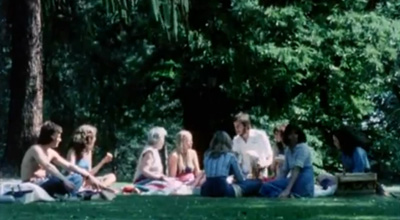
Pete’s pilgrimages to Baba centers
Meher Baba Information in Berkley (Feb & Aug 1968)
Meher Baba Center in Myrtle Beach, South Carolina (Nov 1971 & Aug 1975)
Meher Baba Sufism Re-oriented Center in Walnut Creek, California (Aug 1975)
Meher Baba’s Tomb in Arangoan, India (Jan 1972 & Jan 1976)
Listen to O' Parvardigar live in India 1972
“Far and away the most intense area of Baba activity among the young goes on in San Francisco. I could be wrong but that's the impression I get. In.S.F. itself is the "Sufism Re-oriented" Center. This was originally a Sufi center working to help people on the path, seekers, to understand the problems and nature of discipline and carefully guided efforts. When Baba was heard of, the Center instantly re-oriented its attention and began teaching courses about him. Previous to this they had been working under the wing of the Indian Sufi saint Inayat Khan. I personally love Khan's writings. He wrote all kinds of stuff about music and vibrations and breath and so on. Before settling down to really helping others get it together he had been a famous virtuoso in India on the vina, an instrument a little like the sitar. He was dearly loved and respected both as a musician and as someone whose life reflected his spiritual conviction.
"Today the center is guided by a powerfully clear-minded woman of over 70 -- she is known as the Murshida, and to those who initiate as Sufis, her word is final, backed up fully by Baba himself. She is also a lady of great vigor, adapting her center's activities to accommodate all kinds of people. And they come all shapes and sizes in San Francisco. The best way to describe the other Baba groups in S.F., mainly centered in Berkeley, would be to talk about a day I spent there with Rick Chapman last July. In the morning I visited the Murshida. Her presence always astonishes me, it's easy to tell just how much high level work Baba is doing through her. Her eyes are calm and tired, but her life frantic and ordered. We talked about her work and my desire to make a film, of the special Happy Birthday record/magazine we had made in London to celebrate Baba's birthday. The Murshida had not taken to it with unqualified praise to say the least. I think she forgave me and my pals in the end for allowing our egos to breathe using Baba's name as an umbrella. He is so much like a father, like a friend, that it's easy to forget that he is also God Almighty. Being with Murshida reminded me of the fact, it always does.
"Next day Rick called me and took me in his '60 Continental into the 30-mile queue into Berkeley from S.F. There was a bus strike I think. First stop was a house called Meherstan which is the "light" center for young Berkeley Baba lovers. We arrived, and it seemed like there were quite a few kids. A couple of guys were in groups and asked me all kinds of things about the band and our equipment, another guy who got me to take off my shoes ran a macrobiotic foodstore, Robbie Basho, a guitarist who works very much like John Fahey and whose music I like a lot, was there with a tenth as much hair as he had had in a photograph I had seen, and as usual there were beautiful girls. I talked a bit about Tommy, how it had all come about, I compared their center to our own in London, and we talked pretty formally about life with Baba in general. I talked about dope and my trip, why and how I had stopped using it, and watched knowing smiles from young people flash as I spoke of the new high that I was getting from being with Baba.” [1]
“India was an absolutely, totally mind-blowing experience. Nothing that I was ready for at all. It all started with a visit on our last tour, three years ago, to Myrtle Beach, in South Carolina, on the Atlantic Ocean. It's made up of lots of lakes, kind of an inland Hawaii-type situation with lakes and fairly easy jungles leading down to the Atlantic coast. There are three or four thousand acres there that were a gift for an American Baba center. There are lots of little cottages and places where you can go and stay. Baba loved the place.
"I went there one day, in the middle of the tour, and spent the night in this cabin, a place where Baba had lived. All of a sudden, for the first time in my life, I felt that I was in his presence. I'd never ever met him when he was alive. I put my head on the bed and fucking thought the most incredibly ... unthinkable, unrepeatable, and unspeakable thoughts I've ever had. It was so awful, it was like being in hell. I completely broke up. I finally went out with fucking tears streaming down my face. Tears of self-pity. And I thought that I'd blown it. There I was, in the presence of the Master for the first time, and all that bullshit, all that filth. Listen, I don't even want to relive them by discussing them in any kind of detail. Suffice it to say, they were fantastically disgusting and terrifying. I tried to convince myself that it was just a kind of cleansing process, but that wasn't what it was about at all. It was me fighting like mad not to surrender and using the most subtle, most subconscious way that I knew how. It was very, very spooky...
"Anyway, that prompted a trip to India. I suddenly realized that I was gonna have to go to India and at least meet all the people that were around Baba. I went over there and the first thing that hit me was that India was a fantastically beautiful country. It's the only place where poverty is almost pure. I mean I felt like the fucking peasant with my twenty suitcases and my first-class ticket and my charcoal-gray suit. I felt like a pig, I really did. So to cut a long story short, I ended up in the tomb where Baba was buried. There's a ritual that goes on there in which you walk in, put your head down to the ground, and walk out again. It's a kind of sacred procedure. Awful in a sense. It's just what Baba would never, ever have wanted a ritualistic thing. The first time I went in there, I put my head down and tried to really feel like I was in Baba's presence. And I had the same thoughts that I had when I was in the bedroom at Myrtle Beach. And the same thing happened once again, when I went around the second time. By this time I'm really starting to know what I'm going to think as soon as I get in there. So the third time I go inside, I'm standing there thinking, "Well, I'm washed up. I'm never, ever going to be in the presence of God, so I might as well fucking enjoy being with all these people and have a good time during my unhappy years on earth." And suddenly this young guy walks in and he's obviously got dysentery bad. He's small and fragile, his face is white, and he's shaking like a leaf. Somebody kind of ushers him forward and he looks like well, he brought out all my maternal instincts, if that's possible for a man. I just felt so much compassion for him ... so much sorrow for him, and that sort of identifying self-pity thing that always happens in those situations. And I see him get in, put his head to the ground, and tears begin to stream down my face. I'm so wrapped up in this kid that by the time I get my head down, I've forgotten about what it was that was in my head. I forgot that whole trip. So I get up after realizing that this guy was just a device to get me out of the way, you know what I mean? It was Baba's compassion that had arranged it. It was nothing else. I felt so insignificant that I might as well have been a speck of dust. It was the most incredible feeling I've ever felt in my entire life. And I went out afterwards and collapsed in thanks. That's what happened in India. I came back, and since then really very little has happened. I'm kind of nervous about going back again. I mean I've had my little zap. I don't know how much more I could handle. It's like a door was opened for an instant, just so you could quickly glance inside. Then it slammed shut again. And you think, "Christ, is that where we're all going?" Because if it is, we're all right. I'll tell you that right now.” [2]
“My family (particularly of course my wife, who as a matter of personal policy tries to avoid the aspects of the music world that I still find exciting) had suffered a lot from my pathetic behavior of the previous year, but they would naturally be by my side on any trip other than Who tours. So they came with me, or rather I went with them, to Myrtle Beach, South Carolina, where Meher Baba had set up a retreat during the Fifties. I intended to travel on after a couple of weeks to spend a full month living under the wing of Murshida Duce in California. Murshida Duce is the appointed head of the Sufi movement in the States, as reoriented under Meher Baba's directives. She is used to recognizing and helping her initiates with emotional problems and had invited me to come to be with her and her family when she had visited England in October '74.
"I was genuinely unprepared for the unfolding that transpired in that six weeks. My mind was clouded with the idea of trying to run a "center" for Avatar Meher Baba; with the difficulties I would have trying to deal with people's whims and complaints; but most of all, with the hypocrisy of trying to do such a contentiously idealistic thing while enjoying the kind of life I had been living. We spent an unbelievable ten days. I talked to the older devotees of Meher Baba about my plans for a new place in London and they were naturally encouraging. The sun shone, the children enjoyed themselves, we relaxed and relished rejuvenation at the Master's command. The fears I had that I would not be strong enough to see through the imminent testing rehearsals and tour with the Who receded.
"We traveled then to California. In California, we were well looked after, taken into the bosom of the Sufi family there, provided with a furnished house, picnics, swimming pool, outings to state parks, camping trips to the Sierras and all kinds of straight-laced relaxation. Murshida Duce is a remarkable woman. She heads a group of about 300 initiates, all committed to total honesty and respect for her authority. She has Meher Baba's sanction as the legitimate Murshid along with "in line" decree from her own deceased Murshid, Murshida Martin. Murshida Martin herself took over under the instructions of the famous Inayat Khan, a spiritual teacher and master musician whose books on Sufism present a poetic system for modern life.
"On arrival in California, I went for a talk with her, to gossip, to bring her up-to-date on events at home, to ask her advice about the color of the walls at the newly planned Baba house in London. Instead, to my amazement, I sat and poured out my very soul. I couldn't for a second have anticipated this happening. She sat and listened as I told her every grisly detail: the paranoia, the drunken orgies, the financial chaos, the indulgent self-analysis (continued herein, I'm afraid) and, of course, the dreamy hopes for the future. Without batting an eyelid she listened to stuff that was making me recoil myself, then went on to talk a little about her own youth, her life with her husband, the trouble some of her students were having at the time. In short, she got me right in perspective.” [4]
Meher Baba Center in London
“In Britain there are fewer Baba lovers. There have been a number of centers in London over the years, but it is only recently that the number of young people becoming interested in Baba indicated a need for a permanent center. The first one that I was involved in was actually one of my old pads. Right in the heart of Soho, it was on the top floor of an office block. It was an incredible experience to walk into the sun streaming up there through big half circle windows, and hear Don Stevens, our London father figure (he's actually from S.F.), give a talk on one of Baba's discourses. In the back of my mind were memories of the times I had spent there. Listening to records on a giant system at 200 watts. Making love in the bed built up near the ceiling, watching Alice in Wonderland on the telly, eating baked beans straight out of the tin. Speedy from Thunderclap Newman lives there now, and the atmosphere has probably returned to its original down-home state, the light warm buzz of Baba's presence less evident and yet still there.
"The second is still in use. This one was, believe it or not, my wife's flat. We are a many-flatted couple. Though we do manage to live in one building only today. This one is in Victoria in a basement. It's cool and fairly light for a basement, and it's small. A hundred people have been known to squeeze in there. Only about 20 of them got served with tea. The center is run and financed by a committee which includes myself. The committee sees to it that it is open a couple of days a week, and keeps the bills paid and the library full. It also drinks a lot of tea. One of the dearest women alive is Baba's constant reflection at the London center, Miss Delia De Leon. She is an actress who is now in her 70's, who met Baba when he looked like the most exciting thing to hit Hollywood. "He was magnificent!" It was clearly love with a capital L at first sight for Delia. Baba of course loved everybody and reciprocated. She has the heart of a young girl, and Baba has said that she is very spiritually advanced. Her flippancy and impetuosity are more likenable to a mischievous child than an illusion-wise worker for the Avatar. All of the older Baba lovers are remarkable in their ways. They have something, and people outside of the group have remarked on this independently, that makes them different. That makes it a happier day when you have seen them. That something is Baba.” [1]
Meher Baba Oceanic - The Boathouse
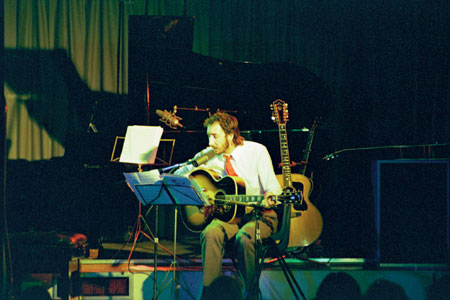
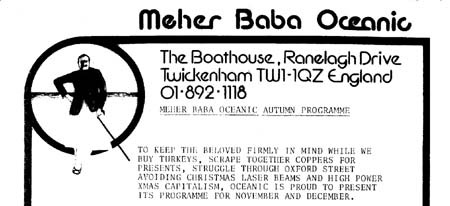 The Oceanic Concert in 1979 (photo from Pete's Sept 17, 2001 diary)
The Oceanic Concert in 1979 (photo from Pete's Sept 17, 2001 diary)
“From 1976-1980 I funded a pilgrim centre in London (Meher Baba Oceanic) which allowed short-term residencies. So I had been accessible to those who were sincerely interested in Meher Baba, and a fairly open target for those who just wanted to meet a rock star. During this time Adi K. Irani was one of a group of disciples who guided me. Adi had been Meher Baba’s secretary for a time, and attended the opening of Oceanic in July 1976, and continued to visit and stay for long periods whenever he travelled to the West. My centre for Meher Baba had also been blessed by Mehera - Meher Baba’s spiritual ‘opposite’, and the principal female disciple. She sent a beautiful pink silk coat once worn by Meher Baba which became the centrepiece of a small collection of precious artifacts that were touched, used or worn by the Master. Delia DeLeon who had met Meher Baba in England in 1931, and who was a devoted disciple all her days, was a driving force behind my efforts to do some work in Britain for Meher Baba. Mani Irani, Meher Baba’s younger sister, and head of the trust in India that administered copyrights, was also encouraging. Murshida Ivy Duce, the head of the Reoriented Sufi movement in California that Meher Baba had sanctioned with his own unique authority, also pulled heavily behind me. One thing they all warned was that my Oceanic centre would only happen if Meher Baba wanted it, and when it had served its purpose it would end. Everything began well, and I greatly enjoyed being a part of the constant ebb and flow of international visitors. I also enjoyed hosting musical concerts, plays and film shows as well as the more usual talks and devotional gatherings. I produced a dozen small films related to Meher Baba, and even directed one myself – ‘Delia’. From 1976 until the middle of 1979 I was (blessed by all but self-appointed) very much in the forefront of all activity in the U.K. surrounding Meher Baba.
"What was clear to me in early 1980 was that I could no longer stand as any kind of public representative for Meher Baba with such recent alcohol and drug-abuse problems. Meher Baba Oceanic, the pilgrim centre I had run, had in any case slowed down to a crawl while I descended into self-obsession. Several of my employees there had gone through problems of their own, and some time in 1982 I impolitely sacked everyone. I then shut down the living quarters and confined the Meher Baba Association to a single room in the building. They moved within a year to new premises they still occupy in Shepherd’s Bush in London – very near the Goldhawk Road, an area very important in The Who’s early career. I concentrated my efforts as a follower of Meher Baba on developing a complete and secure archive of the majority of the extant movie film of him that needed preservation and archiving. That work continues today under the auspices of a new company called MEFA (MeherBaba-European-Film-Archive).” [6]
"I have made very few public statements about Meher Baba for some years. My webcast studio, Oceanic, actually began life as Meher Baba Oceanic in 1976, and ran as a film studio, an open resource and meeting centre for three or four years. From then on I concentrated my ambitions with respect to Meher Baba to looking after an archive of movie films featuring, and about, Meher Baba that I had made and collected during that open period." [24]
"Let me tell you something about this room (Oceanic Studios)... it's a room that's seen a lot, but it started its life very much like this. It started as a center, mainly making films about an Indian spiritual teacher named Meher Baba. Upstairs it had places for people to stay who were travelling from the United States to India, and they would often stop off in London, and we had a couple of bedrooms. We had a week of festivities in the summer of 1976. If you were interested in him, I can assure you, you will be pleased to know that you are on holy ground. Because pretty much every one of Meher Baba's top disciples at some point in time has passed through here, spent time here, been filmed here, spoken here, and gathered here. When the Cocteau Twins took over the building sometime in the late 80's, I remember Liz saying to me that she could feel some kind of energy in the place, and I think it was simply that so much devotional stuff had gone on here." [26]
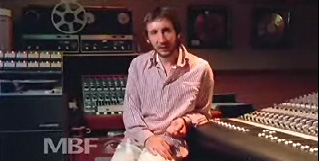
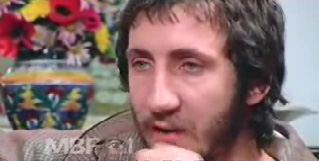
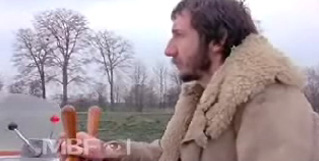
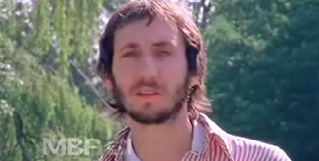
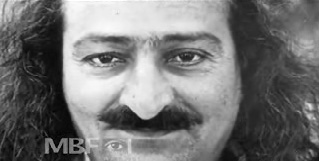
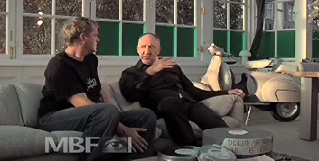
Musical collaborators
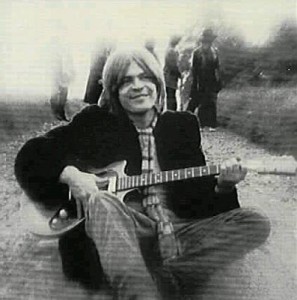
Billy Nicholls
A long time friend and musical associate of Pete’s, Billy has contributed tracks to "I Am" and "Who Came First" (Forever’s No Time At All and This Song Is Green), and performed on "With Love". Billy also released "Meher Baba" in 2011, a charity album to help fund the London Baba Centre. Billy went on to work as the musical director and backing vocalist for Pete Townshend's Deep End shows in 1985, and for The Who on their 1989 and 1996/97 tours.
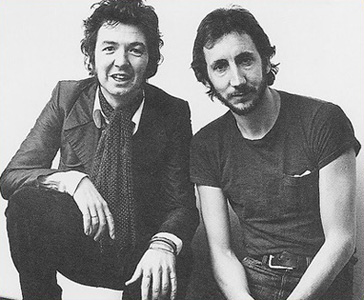
Ronnie Lane (1946 – 1997)
Ronnie Lane (bass player for the Small Faces) was a close friend of Pete’s and fellow Meher Baba devotee dating back to 1967. Ronnie contributed tracks to "Happy Birthday" and "Who Came First" (Evolution) and also performed on "With Love". Ronnie and Pete later went on to collaborate on a studio album, "Rough Mix". An excerpt from the documentary “Ronnie Lane’s The Passing Show” is featured on the Meher Baba Film Archive website.
Raphael Rudd (1956 – 2002)
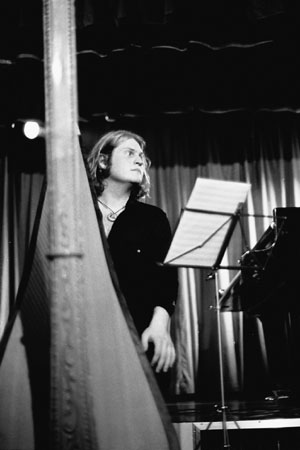 The Oceanic Concert in 1979 (photo from Pete's Sept 17, 2001 diary)
The Oceanic Concert in 1979 (photo from Pete's Sept 17, 2001 diary) Raphael Rudd collaborated with Pete on "The Oceanic Concerts" that were recorded before an invite only audience between 1979 and 1980 at the Oceanic centre in London. Rudd also conducted members of the London Symphony Orchestra and the London Philharmonic at sessions for the Quadrophenia soundtrack; arranged the horns on Townshend's 1980 hit single "Rough Boys;" and worked on demos for Townshend's 1980 "Empty Glass" album. Pete produced Rudd's own music recorded from 1978 to 1980; these tracks were combined with newer material on Rudd's 1996 album "The Awakening".
"Raphael Rudd and I met because of our mutual interest in the Indian spiritual master Avatar Meher Baba. When about five years old Raphael met Meher Baba, who took the child's hands in his own and gazed into his eyes. Later, when Raphael became a musician and dedicated his work to his master, it became clear to everyone that Meher Baba had inspired the child forever. I didn't meet Meher Baba in the flesh. But I was pleased to be able to work with Raphael on this recording project that was to be dedicated to Meher Baba. At one time, searching for a theme for the collection of compositions I suggested that the album should be called The Boy. This was to recognize the importance to the artist of remaining young. While working on this record, I was doing a number of other things, including working on the soundtrack of the movie Quadrophenia. Indeed Raphael orchestrated the final scene of the film and conducted the orchestra with great authority despite being only twenty-one years old at the time. I regarded myself as Raphael's musical mentor during that period. Today, we inspire each other on a more equal footing. I am greatly influenced by Raphael's piano style - especially his modality. To this day, Raphael and I regard ourselves as fellow voyagers on the path to God - who we see manifested clearly in the perfect life and continuing compassionate spiritual presence of Avatar Meher Baba. This might seem romantic, and it is of course. But whatever we like to believe as spiritual seekers, and however lost or vain we might become in our pursuit of art and fame, we are both utterly certain that we are merely channels for the will of god." [8]
Baba inspired albums
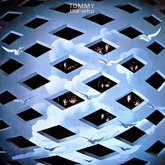
Tommy
The Who
Produced by Kit Lambert
Released May 23, 1969
"The process of writing [Tommy] was controlled by my direct involvement with Baba. His stuff is completely self-contained, and it's a good point to start fucking-up from. On a basic working level, songs like 'I'm Free,' 'Pinball Wizard' and a couple of others are very much Baba, songs of the quiet explosion of divinity. They just rolled off the pen." [9]
"When I did discover Meher Baba, I think all the pieces of jig saw fit into place, and then I was able to start on Tommy in earnest. And I think I was inspired to write Tommy as a spiritual story. The idea was that Tommy would be a young boy who would grow up in adverse circumstances, but those adverse circumstances would lead him to a spiritual pathway. He would then be elected if you like by the masses as a spiritual teacher and then he would in a sense misuse his powers and pay the price. That was the original story. The prayer at the end is two-fold. One, we hear Tommy remembering See Me Feel Me Touch Me Heal Me and then going back on his flight Listening To You I Get The Music turning towards the Universe and praising it, but also I get the sense too that this is the audience too. They are also singing See Me Feel Me Touch Me Heal Me, they are also connecting with what it is that is the real fact of the matter. They are a collection of individuals and each individual has to live his own life. And each individual has a relationship with the Universe. And so the end of Tommy is about that. And I think without having read what Meher Baba said, you know you have to lose yourself in order to find God, and you have to lose yourself in order to find your true self, I don't think I could have hit on it." [10]
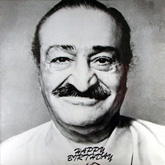
Happy Birthday
Pete Townshend and friends
Produced by Pete Townshend
Released Feb 25, 1970 (Meher Baba's birthday)
Devotional album released by the Universal Spiritual League in London to commemorate Meher Baba's first birthday following his death in 1969. Only 2,500 copies were sold for the original release, some of which were distributed by the Meher Baba Information office in Berkley.
Tracks:
01 Content (Pete Townshend, words (poem) by Maud Kennedy)
02 Evolution (words and music: Ronnie Lane, peformed with Pete Townshend)
03 Day of Silence (words and music: Pete Townshend)
04 Alan Cohen Speaks (Meher Baba's Universal Players, Sitar accompaniment Vytas Serelis)
05 Mary Jane (words: Michael Westlake, music: Pete Townshend)
06 Alan Cohen Speaks (Meher Baba's Universal Players, words by Meher Baba)
07 The Seeker (words and music: Pete Townshend)
08 Meditation (poem by Mike Da Costa)
09 Begin the Beguine (words and music: Cole Porter, peformed by Pete Townshend)
10 With a Smile Up His Nose They Entered (instrumental, music by Ron Geesin)
11 The Love Man (words and music: Pete Townshend)
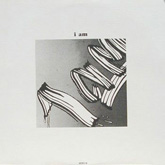
I Am
Pete Townshend and friends
Produced by Pete Townshend
Released 1972
Second devotional album dedicated to Meher Baba was released by the Universal Spiritual League in London.
Tracks:
01 Forever's No Time at All (Billy Nicholls, Katie Mclnnerney, Caleb Quaye)
02 How to Transcend Duality and Influence People (poem by Mike Da Costa)
03 Affirmation (Mike Da Costa)
04 Baba O'Riley (instrumental by Pete Townshend)
05 This Song Is Green (Billy Nicholls)
06 Everywhere I Look This Morning (Hank Mindlin)
07 Dragon (David Hastilow)
08 Parvardigar (Meher Baba's Universal Prayer, music by Pete Townshend)
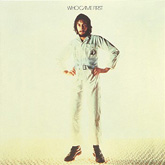
Who Came First
Pete Townshend
Produced by Pete Townshend
Released October 1972
Pete's first solo album, which contains a few of the tracks from Happy Birthday and I Am. Decca Records wanted to release the recordings to a wider audience, and to stop bootlegging of the Happy Birthday and I Am recordings.
"[Decca/MCA] merely encouraged me to put out the album through normal channels. They wanted 25,000 copies to distribute and offered me a dollar an album to give to Baba, a very generous royalty. I decided that if I was going to do on this scale, I might as well do a completely fresh album. I was not thinking of this as a solo album at all. This remained a devotional project. I wanted to include more material by other artists, but eventually I had to stick to the most professional-sounding tracks." [11]
"The album was made because I had to say something and the field in which I work best is music so I did it that way. It does bother me whether it sells or not because the money is going to a temporary trust. Some of it will go to India to people that Baba felt particularly needed help, some of it to regular charities and some for publications. This came about because I did a couple of albums, about 1,000 each, for Baba followers, and they went so well that I decided to do this one. I wanted to put out a lasting piece of music and although I'm not mad about the devotional songs on it – Who fans might find them pretentious – I wanted to find a different musical market which is inevitable." [12]
"These tracks are all tracks that I've recorded at home. I play on all of them except 'Forever's No Time At All' - that, along with the rest of the album, I engineered. Ronnie Lane and I got drunk one night and recorded his 'Evolution' song, and apart from these two exceptions, all the music is from my own head. On this album, in this context, it is dedicated to Baba. Not for him to listen to, his ears aren't around, but so that he will be around whenever it's played." [11]
Tracks:
01 Pure and Easy (Pete Townshend)
02 Evolution (Ronnie Lane)
03 Forever's No Time at All (Billy Nicholls, Katie Mclnnerney)
04 Let's See Action (Nothing Is Everything) (Pete Townshend)
05 Time Is Passing (Pete Townshend)
06 There's A Heartache Following Me (Ray Baker)
07 Sheraton Gibson (Pete Townshend)
08 Content (Pete Townshend, words (poem) by Maud Kennedy)
09 Parvardigar (Meher Baba's Universal Prayer, music by Pete Townshend)
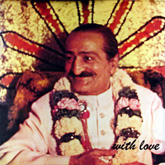
With Love
Pete Townshend and friends
Produced by Pete Townshend
Released March 1976
Third and final devotional album dedicated to Meher Baba.
Tracks:
01 Hail Avatar Meher Baba (Last Qawali Group)
02 Give It Up (Billy Nicholls – Steve Humphries)
03 Without Your Love (Billy Nicholls)
04 His Hands (Pete Townshend)
05 Just For a Moment (Ronnie Lane – Ronnie Wood)
06 Baba Blues (Lol Benboiu)
07 Meher (Paul Edgar Wyld)
08 Contact (Peter Hope-Evans)
09 Gotta Know Ya (Billy Nicholls – Steve Humphries)
10 Sleeping Dog (Pete Townshend)
11 All God's Mornings (Sidney Jordan)
12 Lantern Cabin (Pete Townshend)
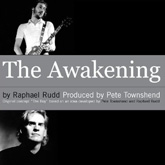
The Awakening
Raphael Rudd
Produced by Pete Townshend
Released 1996
Recorded at Pete’s Eel Pie studios in London between 1978 and 1980. Based on the original concept “The Boy” that was developed by Pete Townshend and Raphael Rudd, The Awakening is centered around Meher Baba. Also featured on the album are Phil Collins on drums, and Annie Haslam (Renaissance) on vocals. Pete and Annie sing on the title track.
“By September (1978) I was recording my first solo album, The Boy, with Pete keeping an eye on things. It was he who came up with the title, an affirmation of the importance of the artist remaining young at heart.” - Raphael Rudd [14]
Tracks:
01 Homage
02 Seasons
03 Travels
04 The Game
05 Kids Like Me
06 Captivity
07 Moments
08 Magic Grace
09 Willow Song
10 The Awakening (with Pete Townshend and Annie Haslam)

The Oceanic Concerts
Pete Townshend and Raphael Rudd
Produced by Pete Townshend
Released 2001
The Oceanic Concerts were recorded at private events before an invited audience between 1979 and 1980 at the Oceanic Centre in London.
"For me, one of the featured highlights of my London adventures was performing in two acoustic concerts with Pete at Eel Pie for an audience of the Meher Baba Oceanic group around Christmastime in 1979 and 1980. Pete generously shared equal billing with me. I was touched by the profundity of the spiritual quality in his music, and on those nights he brought it strongly to the fore. I recall they were powerful and eventful performances, and the playing on those nights inspired us to reach heights I never thought attainable. No one present can forget the final piece of the night, entitled "O'Pavardigar" (a Townshend composition to a Baba prayer), a truly transcendent performance of love and devotion to all the Avatars." - Raphael Rudd [14]
Tracks:
01 Raga - Raphael Rudd (harp)
02 Drowned - Pete Townshend
03 The Seeker - Pete Townshend
04 Magic Grace - Raphael Rudd (harp)
05 Who Is Meher Baba? - Raphael Rudd (piano)
06 The Ferryman - Pete Townshend and Raphael Rudd (harp)
07 Kitty's Theme - Raphael Rudd (harp)
08 A Little Is Enough - Pete Townshend and Raphael Rudd (piano)
09 Contact In Solitude - Raphael Rudd (piano)
10 Sleeping Dog - Pete Townshend and Raphael Rudd (harp)
11 Sound Barrier - Raphael Rudd (piano)
12 Bargain - Pete Townshend
13 Longing For The Beloved - Raphael Rudd (piano)
14 Tattoo - Pete Townshend and Raphael Rudd (harp)
15 Let My Love Open The Door - Pete Townshend and Raphael Rudd (harp)
16 Awakening - Pete Townshend and Raphael Rudd (piano)
17 Western (American) Arti - Raphael Rudd (harp)
18 O'Parvardigar - Pete Townshend and Raphael Rudd (harp)
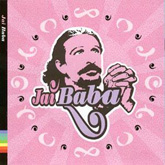
Jai Baba
Pete Townshend and friends
Produced by Pete Townshend
Released 2001
This 2-CD set contains all of the music from the three Meher Baba devotional albums ('Happy Birthday', 'I Am' and 'With Love'), with a bonus 1972 recording of Pete performing O’Parvardigar live in India. The CD was sold on Pete’s Eelpie.com store, and all profits from the sales went to the Meher Baba Trust in India and towards the European Meher Baba Film Archive.
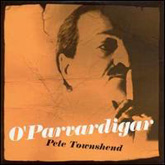
O’ Parvardigar
Pete Townshend
Produced by Pete Townshend
Released 2001
O’ Parvardigar is a 3 song EP of Meher Baba’s Universal Prayer set to music and performed by Pete Townshend. It contains the 1972 studio version, the live in India recording, and a German language version that Pete recorded for the opening of a European Baba Center. All profits from the sales will go to the Meher Baba Trust in India and towards the European Meher Baba Film Archive.
Baba inspired songs
I Can’t Reach You (1967)
"It's easy to be clever looking back, but since I've made public the fact that Meher Baba is believed to be the 'Avatar' (Messiah) by his followers, and that I heard of him in late '67, (soon after this song was written) I can say without pretensions that I was looking for someone." [25]
Faith In Something Bigger (1968)
The first of Pete's songs inspired by his recent reading of The God-Man, a book about Meher Baba. "God, this is embarrassing. I don't know where to hide. Well I mean, the whole thing about HIM is that HE is everywhere isn't HE? A modest beginning to the musico-spiritual work of the irreligious Who. The guitar solo is the worst I've ever heard. They're great lads, the rest of the boys in the band. Do you think anyone else would put up with this nonsense? Anyway, the whole idea is preposterous, something, something bigger than US? US! THE WHO! A quick listen to this lads will bring us quickly down to size I can assure you." [15]
The Seeker (1969)
“Quite loosely, ‘The Seeker’ was just a thing about what I call Divine Desperation, or just Desperation. And what it does to people. I did a version of ‘The Seeker’ which appears on an album which we did for Meher Baba’s birthday celebrations, which I still dig more than the version done by the Who.”[16]
Days of Silence (1969)
"Written on my Marshall and Rose English mahogany upright piano, on July 10th [1969], which is the day followers of Meher Baba choose to spend without speaking. I wrote the lyrics the day after so I wouldn't break my silence." [25]
Begin the Beguine (Cole Porter) (recorded 1969)
"I visited his tomb and there is a ritual there, when all his followers stand around the tomb and sing 'Begin the Beguine,' which was one of his favourite songs. It totally zapped me out when I was there. I stood up after all this and was crying and everything." [12]
Drowned (March 1970)
“The song employed a lyric I had written to sing at various Meher Baba musical gatherings I was attending at the time, and I sang it facing Meher Baba’s tomb on my first visit to India in January 1972.” [17]
"This song, included in Quadrophenia, should actually stand alone. I think in a sense it does. When the tragic hero of Q sings it, it is desperate and nihilistic. In fact, it's a love song, God's love being the ocean and our 'selves' being the drops of water that make it up. Meher Baba said, 'I am the Ocean of Love.' I want to drown in that ocean, the 'drop' will then be an ocean itself.” [25]
Pure and Easy (September 1970 demo)
The opening track to Who Came First. “With lyrics of sublime spiritual beauty, “Pure and Easy” conflates the metaphysical power of music with the transcendence of love, underscoring an achingly pretty melody with an uplifting ascending chord progression. ‘There once was a note, pure and easy, playing so free like a breath rippling by. The note is eternal, I hear it, it sees me. Forever we blend is forever we die.” [11]
Let's See Action (1971)
" Written about a section of the LIFE HOUSE film, it's about the people who act in a revolution, and the people that sit back. I thought it also said a lot about the way we forget our souls most of the time. [18]
Baba O’Riley (May 1971)
“The story of Lifehouse is simply about a time when technology delivers its promise. And what the promise of technology has always been is that entertainment will replace religion. And so I chose 2 subjects that I was very fond of at the time. One was an Indian teacher called Meher Baba, and I’d started to follow him and study his writings, and other writings that he recommended, particularly Sufi writings about music, about 3 or 4 years before I started on Lifehouse. The other person was an electronic musician who’s luckily still going strong called Terry Riley. I concocted this organ sound through a synthesizer, which you hear bubbling away in the back of Baba O’Riley. So the two names together were Baba, for Meher Baba, and O’Riley for Terry Riley, and it’s O’Riley because it sounded a bit Irish at the end.” [19]
Bargain (June 1971)
“Here is a song which is about the God Mans love, the Masters love, is the most precious thing you can find. But somehow, although it takes you a lifetime, or a number of lifetimes to find, it's still, strangely enough, the easiest thing, the cheapest thing, the simplest thing, to find, to get, just as long as you know how. And I call it a bargain.” [20]
"The song is about the spiritual search, so it was written about my thing with Meher Baba, not about him. In Lifehouse it was a love song, but a love song about a higher love, a love between disciple and master." [27]
O’ Parvardigar (1972)
"This is Baba's incredible 'Universal Prayer' put to music by yours truly. I think, along with many others, that it is a prayer which praises the whole of Universal Creation as well as the Messiah. A difficult one to talk about. This whole thing is the result of one of those unremarkable coincidences that affect the person involved so much, and yet seem so ordinary to others. My wife and I were on holiday on Osea Island in the Blackwater Estuary. I was working on the words one afternoon; trying to make the original prayer scan, make it feel like it could be put to music. The same afternoon, I discovered a really beautiful tuning for six string guitar and somewhere in the back of my head, gave it to Baba. He took it graciously it seems, for later that day I got the hit that maybe the words from the prayer would fit the music. They fit like a glove. If this doesn't sound completely like me, maybe it ain't." [18]
Time is Passing (1972)
“I played this to Baba’s mandali and followers when I went to India this year” [11]
Love Reign O’er Me (May 1972)
"'Love Reign O'er Me' is similar to 'Drowned' in meaning. This refers to Meher Baba's one time comment that rain was a blessing from God; that thunder was God's Voice. It's another plea to drown, only this time in the rain.” [25]
The Ferryman (June 1976)
“This is a song I wrote originally for a play that was done here [at Oceanic] about Siddhartha. Written by King Graham, and he asked me to write a song about the moment of which the Ferryman, who turns out to be Siddharthas master, hands over the job of punting the ferry from side to side, because it's the river that is the teacher, and the actual path is the ferry. This is the song about the actual moment of which Siddhartha finally finds his true master, the Ferryman, and the job is handed over.” [20]
Don’t Let Go The Coat (January 1980)
The title of the song is inspired by a phrase often used by Meher Baba that his disciples "hang fast to the hem of my robe," where the robe is a metaphor for his teachings.
I Am An Animal, Empty Glass, A Little Is Enough (1980)
"A lot of the songs on the album - well, 'Let My Love Open the Door' is just a ditty - but particularly 'A Little Is Enough' and a couple of the others - 'I Am an Animal,' I think - are getting close to what I feel I want to be writing: in terms of somebody who's thirty-five writing a rock song, but one which isn't in the George Jones-Willie Nelson tradition - 'I'm a smashed-up fucker standing at the bar .' 'Empty Glass' is a direct jump from Persian Sufi poetry Hafiz - he was a poet in the fourteenth century - used to talk about God's love being wine, and that we learn to be intoxicated, and that the heart is like an empty cup. You hold up the heart, and hope that God's grace will fill your cup with his wine. You stand in the tavern, a useless soul waiting for the barman to give you a drink - the barman being God. It's also Meher Baba talking about the fact that the heart is like a glass, and that God can't fill it up with his love - if it's already filled with love for yourself, used those images deliberately." [21]
“Meher Baba’s secretary Adi Irani made a visit to London around this time, I tried to get his advice. ‘My wife doesn’t love me anymore,’ I said. ‘What should I do?’ ‘She doesn’t love you at all?’ He wobbled his head as he spoke. ‘She said she loved me a little.’ ‘Ah!’ Adi clapped his hands and smiled. ‘A little! That’s good. Love is universal. Limitless. So even a little is enough.’ I wrote a song called ‘A Little Is Enough’, and recorded it using the same system as I’d used on ‘Let My Love Open the Door’. Although I’d always thought my love songs were terrible, I think this is one of the best songs I’ve ever written.” [22]
The Shout (March 1984)
“I once used to say that I didn't really write love songs because I felt I didn't write love songs. If I was writing about love, I was writing about something that I thought was higher than simple love. The thing that I found was that some of the best songs that I have written about the spiritual path have been inspired by women. This is one of them. This is called The Shout.” [23]
God Speaks of Marty Robbins (2005)
"On the The Boy Who Heard Music Blog I am currently running, the narrator has just referred to an Indian teacher he followed called 'Bollo'. This is in Chapter Eleven. This has triggered a few comments about Meher Baba. In response to this Blog-intercourse I am going to show The Theme of Creation on TowserTV at various times. The next 24 hour showing will be later this week, Thursday Dec 1st. This is a film made by Tim Thelen about Meher Baba's extraordinary (and somewhat baffling) book God Speaks in which he explains the Universe. The film closes with a guitar piece I wrote called Marty Robbins. Tim's film really helps me get to grips with what the book is conveying about our human function. I have since written words for the piece, that I've rechristened God Speaks - through Marty Robbins." [24]
Credits
Produced, researched and written by Carrie Pratt
Additional research by Brian Cady
References
[1] "In Love With Meher Baba" by Pete Townshend - Rolling Stone, No. 71 (November 26, 1970)
[2] The Penthouse Interview with Pete Townshend (December, 1974)
[3] Hit Parader interview with Pete Townshend (June 1975)
[4] “The Punk Meets the Godmother: Pete Townshend Looks Back” Rolling Stone interview with Pete Townshend(Nov 17, 1977)
[5] Rolling Stone interview with Pete Townshend (May 14, 1970)
[6] “Meher Baba – The Silent Master” by Pete Townshend – petetownshend.com (July 2001)
[7] “Afterword” – Who I Am autobiography by Pete Townshend (March 2013)
[8] Liner notes for The Awakening by Pete Townshend (1996)
[9] "Pete and Tommy, Among Others" Rolling Stone interview with Pete Townshend (July 12, 1969)
[10] "Sensation: The Story of The Who's Tommy" BBC documentary interview with Pete Townshend (Oct 25, 2013)
[11] Who Came First liner notes by Pete Townshend (2006)
[12] DandME interview with Pete Townshend (Oct 21, 1972)
[13] Pete Townshend blog entry on thewho.com (Oct 28, 2013)
[14] Liner notes for The Oceanic Concerts by Raphael Rudd (2001)
[15] Odds and Sods liner notes by Pete Townshend (1974)
[16] Rolling Stone “A Talk with Pete Townshend” (May 14, 1970)
[17] Quadrophenia Directors Cut liner notes by Pete Townshend (2011)
[18] Sounds interview with Pete Townshend (June 24, 1972)
[19] Pete Townshend Storytellers stage banter (2000)
[20] Pete Townshend Oceanic Concerts stage banter (1979 and 1980)
[21] Rolling Stone Pete Townshend interview (June 26, 1980)
[22] Who I Am autobiography by Pete Townshend (2012)
[23] Pete Townshend Fillmore West concert stage banter (April 30, 1996)
[24] "Meher Baba - God Speaks - a movie" Pete's Diaries on petetownshend.com (November 29, 2005)
[25] Decade of The Who (1977)
[26] Basement Jam Pete Townshend stage banter (December 4, 2005)
[25] Decade of The Who (1977)
[27] Team Rock interview (2007)
